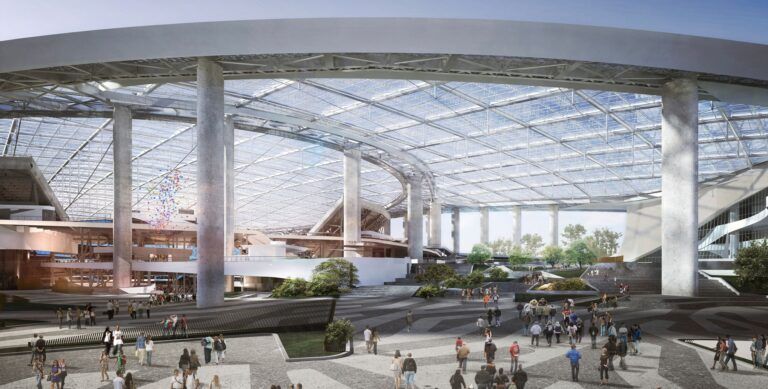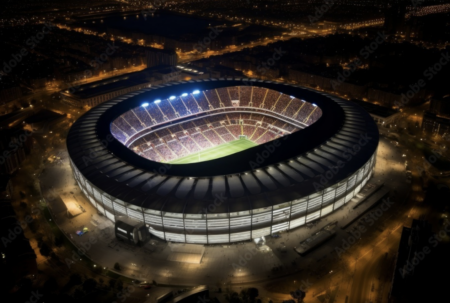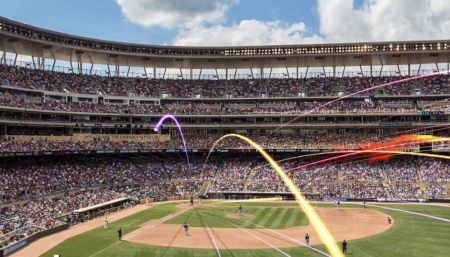The global pandemic delayed the much-anticipated debut of SoFi Stadium – postponing the venue’s first event, a Taylor Swift concert scheduled in July, and NFL preseason games for the Los Angeles Rams and Chargers. But HKS’ Mark Williams, the project’s principal in charge involved in all aspects of design, documentation and construction, is managing the uncertainty in stride.
“SoFi is ready when events and fans return. It was designed to transcend time,” he says.
Williams has been hands-on since day one of the project, charged with bringing to life the world-class sports and entertainment destination – the vision of Los Angeles Rams Owner and Chairman E. Stanley Kroenke. Williams recalls a day in 2014 when he and a small group from the Rams ascended to the roof of the Hollywood Park racetrack on the project site. “We knew where we were standing was the same elevation of the new stadium’s upper concourse,” said Williams.
From this perch, they gazed out upon views of L.A., the Pacific Ocean and the scenic San Gabriel Mountains range to the east. “It was a breathtaking moment. To have this backdrop to design around and within is rare. We knew right then the potential this stadium had to complement the grandeur of the site, the spectacular views and the excitement we equate with Southern California, the entertainment capital of the world.”
It is Williams’ nature to think long term – his line of work requires a patient and measured approach. The iconic sports and entertainment venues HKS bring to fruition take years from conception to completion. The unexpected can and does happen, and Williams has experienced it in his career many times. But the worst health crisis in a century is an event no living designer has dealt with before. Yet, Williams remains upbeat.
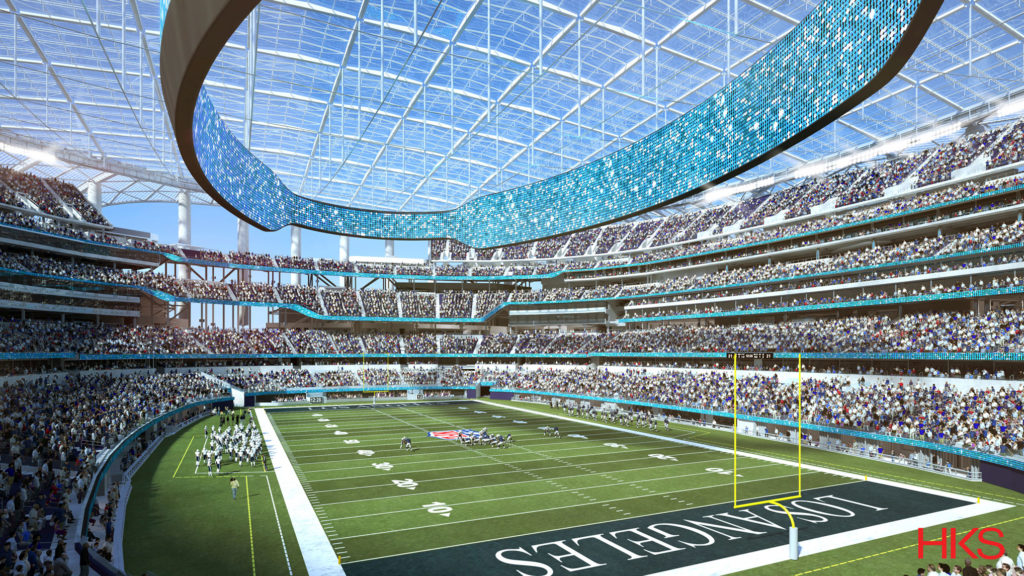
“Having to wait to experience SoFi in person is difficult, but the anticipation will only build,” he says. “The arrival sequence and procession into the complex through meandering paths and canyons full of landscape features is inspired by the ecologies of the region. The sensation of finally setting foot in SoFi Stadium, experiencing the seating bowl, amenities, views and many environments will only be amplified.”
“The impact that sports and entertainment experiences have on individuals, families and communities has been with me for as long as I can remember. That excitement, energy and roar of the crowd just grew with my understanding of the profound influence these experiences have on people,” says Williams. “I had a strong desire to elevate that experience and help people of all ages celebrate those moments through design.”
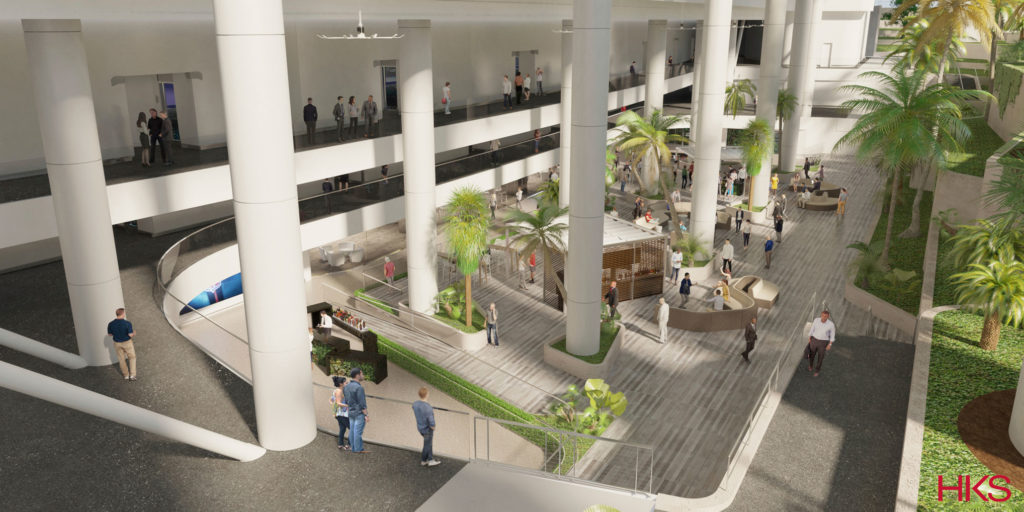
Kevin Demoff, the Los Angeles Rams chief operating officer, spoke to Williams’ contribution to the ground-breaking design of SoFi Stadium.
“Mark’s relentless inquisitive nature challenged us to be at our best as we all re-imagined the role stadiums can play at the heart of integrated campuses. He consistently kept the users, fans and athletes at the core of our project while incorporating design drivers that were authentic to our project. Mark’s creativity means challenges are addressed as opportunities and feedback is sought not looking for praise, but as a means to refinement.”
Merging the digital and physical
2020 was set to be momentous for Williams and HKS with the opening of two professional venues – the 3.1 million square-foot, 70,000-seat sports and entertainment SoFi Stadium in Inglewood, California; and Major League Baseball’s new Texas Rangers home, Globe Life Field, in Arlington, Texas.
The Rangers are playing a truncated 60-game season without fans in attendance. And with California experiencing high rates of coronavirus transmission, both the Rams and Chargers first regular season games, scheduled for September 13 and 20th respectively, are also slated to kick off without fans in the seating bowl.

For now, fans can only experience live sports in the digital realm – the physical will have to wait until medical experts and government leaders, in tandem with venue and league owners, determine when and how to safely open facilities amid the pandemic.
While Williams believes that most people would choose to experience a game or concert live – anecdotally citing the torrent of social media posts that portray in-person experiential content – he’s constantly considering “what if?” questions about the future of digital and virtual engagement experiences.
Early and consistently, HKS and Williams have championed the integration of technology in sports and entertainment venues, enhancing the in-stadium experience well beyond instant replay. “Technology frames our lives – we carry computers that double as phones wherever we go. We’re multitasking constantly. This is about leveraging technology as a portal to content beyond what’s happening on the field that satisfies individuals and elevates the live experience,” says Williams.
SoFi Stadium’s 2.2 million-pound elliptical videoboard is a next-generation digital stadium experience with infinite potential to deliver curated content.
“The digital experience at SoFi Stadium is truly immersive and ensures that no matter where guests are in the venue, they’ll have unparalleled and unobstructed access to content,” says Williams.
For Williams and HKS, technological integration in stadiums and its use by the masses is the next frontier in sports and entertainment. “We will be able to offer the game-day experience to a virtual audience regardless of their location, anywhere in the world. For example, an NFL or NBA fan in Delhi will be able to choose their seat and experience an audio-visual replication from the same vantage point as the fan who bought the physical ticket – and that same seat and experience can be offered an infinite number of times,” he says.
“The integration of technology in physical environments extends venue access exponentially,” says Williams. “Imagine a venue that sells 70,000 physical tickets to an event and leveraging technology to reach previously untapped audiences and markets around the globe.” Through the virtual lens, Williams sees opportunities from the franchise, sponsorship, data and demographic levels to connect more people to live sports and entertainment events while creating new revenue streams.
With SoFi expected to host Super Bowl LVI in 2022, the College Football Championship Game in 2023, and the Opening and Closing Ceremonies of the Olympic Games in 2028, Williams puts the notion of time and permanence into perspective with what the world is living through now.
“Technology has enabled our instant gratification culture, which makes waiting for anything a challenge. Everyone is itching to get out and experience life again,” he says. “Technology is ubiquitous and has forever changed how we live, and the pandemic has proven technology doesn’t replace our need for deeper human connections.
“The thrill and simple pleasure of gathering with our friends, families and even strangers at an event is something humans have cherished since the first stadia were built, and that won’t change.”
This article was originally published by HKS Architects and edited for Stadia


